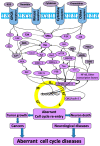FDA-Approved Kinase Inhibitors in Preclinical and Clinical Trials for Neurological Disorders
- PMID: 36558997
- PMCID: PMC9784968
- DOI: 10.3390/ph15121546
FDA-Approved Kinase Inhibitors in Preclinical and Clinical Trials for Neurological Disorders
Abstract
Cancers and neurological disorders are two major types of diseases. We previously developed a new concept termed "Aberrant Cell Cycle Diseases" (ACCD), revealing that these two diseases share a common mechanism of aberrant cell cycle re-entry. The aberrant cell cycle re-entry is manifested as kinase/oncogene activation and tumor suppressor inactivation, which are hallmarks of both tumor growth in cancers and neuronal death in neurological disorders. Therefore, some cancer therapies (e.g., kinase inhibition, tumor suppressor elevation) can be leveraged for neurological treatments. The United States Food and Drug Administration (US FDA) has so far approved 74 kinase inhibitors, with numerous other kinase inhibitors in clinical trials, mostly for the treatment of cancers. In contrast, there are dire unmet needs of FDA-approved drugs for neurological treatments, such as Alzheimer's disease (AD), intracerebral hemorrhage (ICH), ischemic stroke (IS), traumatic brain injury (TBI), and others. In this review, we list these 74 FDA-approved kinase-targeted drugs and identify those that have been reported in preclinical and/or clinical trials for neurological disorders, with a purpose of discussing the feasibility and applicability of leveraging these cancer drugs (FDA-approved kinase inhibitors) for neurological treatments.
Keywords: aberrant cell cycle disease; cancers; kinase inhibitors; neurological disorders.
Conflict of interest statement
The authors declare no conflict of interest.
Figures

Similar articles
-
Tumor Suppressor MicroRNAs in Clinical and Preclinical Trials for Neurological Disorders.Pharmaceuticals (Basel). 2024 Mar 27;17(4):426. doi: 10.3390/ph17040426. Pharmaceuticals (Basel). 2024. PMID: 38675388 Free PMC article. Review.
-
Properties of FDA-approved small molecule protein kinase inhibitors: A 2020 update.Pharmacol Res. 2020 Feb;152:104609. doi: 10.1016/j.phrs.2019.104609. Epub 2019 Dec 17. Pharmacol Res. 2020. PMID: 31862477 Review.
-
Repurposing FDA Approved Drugs as JNK3 Inhibitor for Prevention of Neuroinflammation Induced by MCAO in Rats.J Inflamm Res. 2020 Dec 24;13:1185-1205. doi: 10.2147/JIR.S284471. eCollection 2020. J Inflamm Res. 2020. Retraction in: J Inflamm Res. 2022 Nov 07;15:6069-6070. doi: 10.2147/JIR.S395887. PMID: 33384558 Free PMC article. Retracted.
-
Candidate cancer-targeting agents identified by expression-profiling arrays.Onco Targets Ther. 2013 Apr 23;6:447-58. doi: 10.2147/OTT.S42858. Print 2013. Onco Targets Ther. 2013. PMID: 23637543 Free PMC article.
-
Paradigm shift in NMDA receptor antagonist drug development: molecular mechanism of uncompetitive inhibition by memantine in the treatment of Alzheimer's disease and other neurologic disorders.J Alzheimers Dis. 2004 Dec;6(6 Suppl):S61-74. doi: 10.3233/jad-2004-6s610. J Alzheimers Dis. 2004. PMID: 15665416
Cited by
-
Profiling tyrosine kinase inhibitors as AD therapeutics in a mouse model of AD.Mol Brain. 2023 Aug 14;16(1):63. doi: 10.1186/s13041-023-01051-9. Mol Brain. 2023. PMID: 37580778 Free PMC article.
-
Tumor Suppressor MicroRNAs in Clinical and Preclinical Trials for Neurological Disorders.Pharmaceuticals (Basel). 2024 Mar 27;17(4):426. doi: 10.3390/ph17040426. Pharmaceuticals (Basel). 2024. PMID: 38675388 Free PMC article. Review.
-
Application of parallel artificial membrane permeability assay technique and chemometric modeling for blood-brain barrier permeability prediction of protein kinase inhibitors.Future Med Chem. 2024;16(9):873-885. doi: 10.4155/fmc-2023-0390. Epub 2024 Apr 19. Future Med Chem. 2024. PMID: 38639375 Free PMC article.
-
Mapping the substrate landscape of protein phosphatase 2A catalytic subunit PPP2CA.iScience. 2024 Feb 19;27(3):109302. doi: 10.1016/j.isci.2024.109302. eCollection 2024 Mar 15. iScience. 2024. PMID: 38450154 Free PMC article.
-
PROTAC chemical probes for histone deacetylase enzymes.RSC Chem Biol. 2023 Jul 27;4(9):623-634. doi: 10.1039/d3cb00105a. eCollection 2023 Aug 30. RSC Chem Biol. 2023. PMID: 37654508 Free PMC article. Review.

